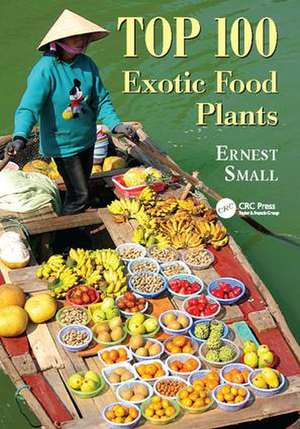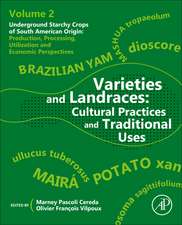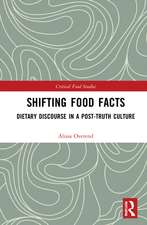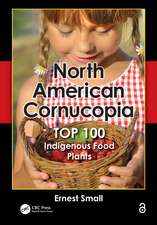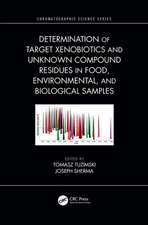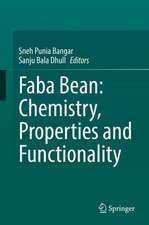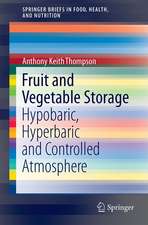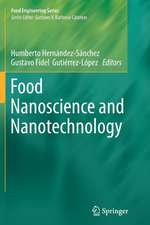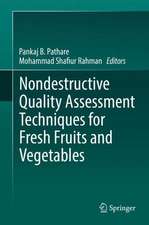Top 100 Exotic Food Plants
Autor Ernest Smallen Limba Engleză Paperback – 7 iun 2017
Wide-ranging in scope, this volume’s coverage includes plants that produce fruits, vegetables, spices, culinary herbs, nuts, and extracts. A user-friendly format enables readers to easily locate information on botanical and agricultural aspects, economic and social importance, food uses, storage, preparation, and potential toxicity. The book also contains an introductory chapter that reviews important historical, economic, geopolitical, health, environmental, and ethical considerations associated with exotic food plants. Thoroughly referenced with more than 2000 literature citations, this book is enhanced by more than 200 drawings, many chosen from historical art of extraordinary quality.
This timely volume also highlights previously obscure edible plants that have recently become prominent as a result of sensationalistic media reports stemming from their inherently entertaining or socially controversial natures. Some of these plants include the acai berry, kava, hemp, and opium poppy. A scholarly yet accessible presentation, the book is filled with numerous memorable, fascinating, and humorous facts, making it an entertaining and stimulating read that will appeal to a broad audience.
| Toate formatele și edițiile | Preț | Express |
|---|---|---|
| Paperback (1) | 585.27 lei 6-8 săpt. | |
| CRC Press – 7 iun 2017 | 585.27 lei 6-8 săpt. | |
| Hardback (1) | 1413.81 lei 6-8 săpt. | |
| CRC Press – 23 aug 2011 | 1413.81 lei 6-8 săpt. |
Preț: 585.27 lei
Preț vechi: 688.56 lei
-15% Nou
Puncte Express: 878
Preț estimativ în valută:
111.100€ • 119.76$ • 93.38£
111.100€ • 119.76$ • 93.38£
Carte tipărită la comandă
Livrare economică 17 aprilie-01 mai
Preluare comenzi: 021 569.72.76
Specificații
ISBN-13: 9781138116665
ISBN-10: 1138116661
Pagini: 708
Ilustrații: 202
Dimensiuni: 178 x 254 x 36 mm
Greutate: 0.45 kg
Ediția:1
Editura: CRC Press
Colecția CRC Press
ISBN-10: 1138116661
Pagini: 708
Ilustrații: 202
Dimensiuni: 178 x 254 x 36 mm
Greutate: 0.45 kg
Ediția:1
Editura: CRC Press
Colecția CRC Press
Public țintă
Professional ReferenceCuprins
Introduction. Statistical Summary and Format of Presentation for the Exotic. Food Plants. Acai Berry. Acerola (Barbados Cherry). Akee. Allspice (Pimento). Arrowroot. Asafetida. Bamboo.Baobab. Bay. Betelnut. Breadfruit. Cacti. Candlenut. Cape Gooseberries and Tomatillo: Physalis Species. Caper. Carambola, Star Fruit. Carob. Cashew. Cassabanana. Ceriman. Chayote. Cherimoya and Atemoya. Chinese Artichoke. Citron. Clove. Coca. Coco De Mer (Double Coconut). Culantro. Cumin and Black Cumin. Cycads. Durian. Epazote. Feijoa. Fenu Greek. Galangal. Ginger. Ginkgo. Goji. Grass Pea. Guarana. Guava. Gum Arabic. Hemp (Hempseed). Horseradish Tree. Jackfruit. Japanese Vegetables. Jicama. Jujube. Kava. Khat. Kiwi. Kumquat. Lemongrass. Lemon Verbena. Loofah. Loquat. Lychee, Longan, and Rambutan. Macadamia Nut. Mangosteen. Medlar. Melons (Exotic). Miracle Fruit. Myrrh. Neem. Noni (Indian Mulberry). Nutmeg and Mace. Oca. Okra. Opium Poppy. Palmyra Palm. Passionfruit (Granadilla). Peach Palm. Pepino. Padilla. Persimmon. Pomegranate. Quinine. Rooibos Tea. Rose Apple. Roselle. Saffron. Sago Palm. Sapodilla. Sapote. Sarsaparilla. Sea Buckthorn. Spinach (Exotic Species). Stevia. Sweetsop and Soursop. Tamarind. Tobacco. Tree Tomato (Tamarillo). Turmeric. Vietnamese Herbs. Wasabi. Water Chestnut. WaxGourd. Wonderberry and Garden Huckleberry.Yard-Long Bean. Zedoary. Appendices. Index.
Notă biografică
Dr. Ernest Small received a doctorate in plant evolution from the University of California at Los Angeles in 1969 and has since been employed with the Research Branch of Agriculture and Agri-Food Canada, where he presently holds the status of Principal Research Scientist. He is the author of over 300 scientific publications on plants and 13 books, several of which have received major awards. Dr. Small’s career has included dozens of appearances as an expert botanical witness in court cases, acting as an adviser to national governments, presenting numerous invited university and professional association lectures, supervising post-graduate students at various universities, participating in international societies and committees, journal editing, and media interviews.
Recenzii
"… this book's utility is as a condensed summary of likely avenues of interest for people working with the described plants, or an engaging read that could lead to research inspirations. It may also fulfill its mission of encouraging use of a wider range of culinary ingredients."
—Susanne Masters, University of Kent, in Economic Botany, 2013
"The book is certainly a pleasure to read. It is filled with colorful cultural references and fascinating facts about the plants and their products. I laughed out loud when I read the descriptions of the flavor of durian, "…French custard passed through a sewer pipe." The book would be welcome on the shelf in reading rooms of botanic gardens, garden clubs and culinary groups. Plant descriptions are not comprehensive in a botanical sense, but the text would be suitable to courses in economic botany, human culture and agriculture."
—Eric La Fountaine, Accessions Technician, UBC Botanical Garden in The Canadian Botanical Association Bulletin, September/Septembre 2014. Volume 47 No2
—Susanne Masters, University of Kent, in Economic Botany, 2013
"The book is certainly a pleasure to read. It is filled with colorful cultural references and fascinating facts about the plants and their products. I laughed out loud when I read the descriptions of the flavor of durian, "…French custard passed through a sewer pipe." The book would be welcome on the shelf in reading rooms of botanic gardens, garden clubs and culinary groups. Plant descriptions are not comprehensive in a botanical sense, but the text would be suitable to courses in economic botany, human culture and agriculture."
—Eric La Fountaine, Accessions Technician, UBC Botanical Garden in The Canadian Botanical Association Bulletin, September/Septembre 2014. Volume 47 No2
Descriere
Many edible plants considered exotic in the Western world are actually quite mainstream in other cultures. This volume provides comprehensive coverage of tropical and semitropical food plants, reviewing scientific and technological information as well as their culinary uses. A user-friendly format enables readers to easily locate information on botanical and agricultural aspects, economic and social importance, food uses, storage, preparation, and potential toxicity. The book also contains a chapter that reviews important historical, economic, geopolitical, health, environmental, and ethical considerations associated with exotic food plants. The book is enhanced by more than 200 drawings, many chosen from historical art of extraordinary quality.
